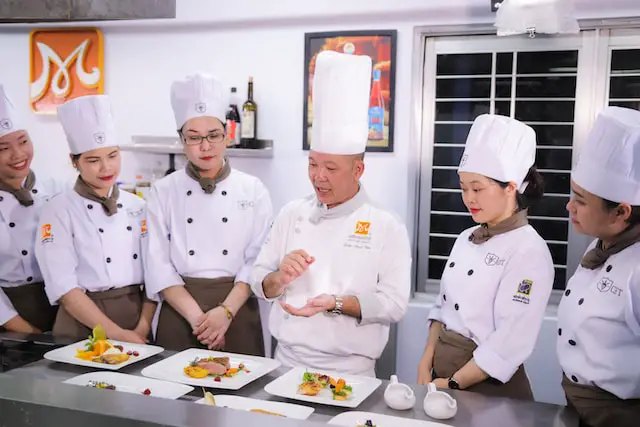Being a chef in a bustling kitchen can be an exhilarating experience. The sizzling pans, the aroma of spices, and the sound of chopping knives all contribute to the vibrant atmosphere. However, the intense heat generated by stoves, ovens, and other kitchen equipment can make the environment sweltering. So, how do chefs manage to stay cool and composed while preparing delicious meals for their patrons? In this article, we will explore some strategies employed by chefs to beat the heat and maintain their coolness in the kitchen.
1. Choosing the Right Clothing
When it comes to clothing in the kitchen, different chefs have their own preferences. While some chefs prefer the traditional chef whites, others take additional measures to stay cool. To get rid of sweating, many chefs opt for wearing an extra layer underneath their chef whites. This might sound counterintuitive, but it actually does the job. The additional layer acts as a barrier between the body and the chef whites, preventing sweat from seeping through and making the chef feel uncomfortable.
Here are some clothing tips that chefs swear by to stay cool:
- Lightweight Breathable Clothing: Chefs prefer wearing lightweight and breathable fabrics that allow air circulation and prevent overheating. Fabrics such as cotton, linen, and moisture-wicking materials are popular choices.
- Compression-style Sports Tops: Some chefs find that compression-style sports tops help them stay cool by wicking away sweat and keeping their body temperature regulated.
- Silk Tank Tops: Surprisingly, several women chefs highly recommend silk tank tops as their preferred choice for staying cool in the kitchen. Silk has natural cooling properties and is known for its breathability.
2. Hydration is Key
To combat the heat and stay cool in the kitchen, chefs need to prioritize hydration. Always staying hydrated with plain water or healthy juices helps regulate body temperature and prevents dehydration. Here are some tips for chefs to stay adequately hydrated:
- Drink Plenty of Cold Water: Keeping a bottle of cold water within reach is essential for chefs. Sipping water throughout the day helps cool down the body and replenish fluids lost through sweating.
- Healthy Juices: Alongside water, incorporating healthy juices into their routine can provide essential nutrients and keep chefs refreshed.
3. Utilizing Ventilation and Airflow
Proper ventilation and airflow play a crucial role in maintaining a cool and comfortable kitchen environment. Here are some techniques chefs employ:
- Good Quality Extract Fan System: Having a reliable extract fan system installed in the kitchen is essential. It helps remove heat, smoke, and odors, improving air quality and keeping the kitchen cooler.
- Floor Fans: Placing floor fans strategically in the kitchen can greatly enhance airflow and provide relief from the heat. Positioning them near workstations or cooking areas helps circulate air and keep chefs cool.
- Rolling Up Pants: When the heat becomes unbearable, some chefs roll up their pants to allow air to circulate around their legs, providing a sense of relief.
4. Smart Cooking Techniques
Chefs can also adopt smart cooking techniques to minimize the heat generated in the kitchen. Here are some tips to keep the kitchen cool while preparing meals:
- Keep the Flame Low: By cooking on a low flame, chefs can control the amount of heat produced and maintain a more comfortable kitchen temperature.
- Close Curtains or Shades: Blocking out direct sunlight by closing curtains or shades can help prevent the kitchen from heating up excessively.
- Use Fans: In addition to floor fans, utilizing portable fans or ceiling fans can create airflow and circulate cooler air throughout the kitchen.
- Don’t Turn the Oven On When Not Needed: Avoiding unnecessary oven usage can significantly reduce the heat in the kitchen. Opt for alternative cooking methods, such as grilling or using the stovetop, whenever possible.
- Cook Outside: On particularly hot days, chefs can take advantage of outdoor cooking spaces, such as grills or barbecue areas, to keep the kitchen temperature cooler.
5. Installing Air Conditioning
Installing air conditioning in the kitchen has several advantages, as long as certain safety precautions are taken. While it might not be a feasible option for every kitchen, it can be considered for larger establishments or professional culinary spaces. You can also install AC in a living room if your kitchen is open. Here are some key points to keep in mind:
- Prevent Overheating: Installing air conditioning can prevent the kitchen from overheating, providing a comfortable working environment for chefs.
- Cook Earlier in the Day: If possible, scheduling cooking activities earlier in the day can help avoid the peak heat hours and reduce the overall temperature in the kitchen.
- Close the Shades: Keeping the shades closed during the hottest part of the day can help prevent heat from entering the kitchen.
- Clean Your Fridge and Freezer: Regularly cleaning and maintaining your refrigerator and freezer ensures optimal cooling performance, minimizing the heat they emit into the kitchen.
In conclusion, chefs employ various strategies to stay cool in the heat of the kitchen. From choosing appropriate clothing to optimizing ventilation and using smart cooking techniques, these professionals know how to beat the heat while creating culinary masterpieces. By implementing these tips and tricks, chefs can maintain their coolness and continue to impress diners with their delicious creations, even in the hottest of kitchens.
